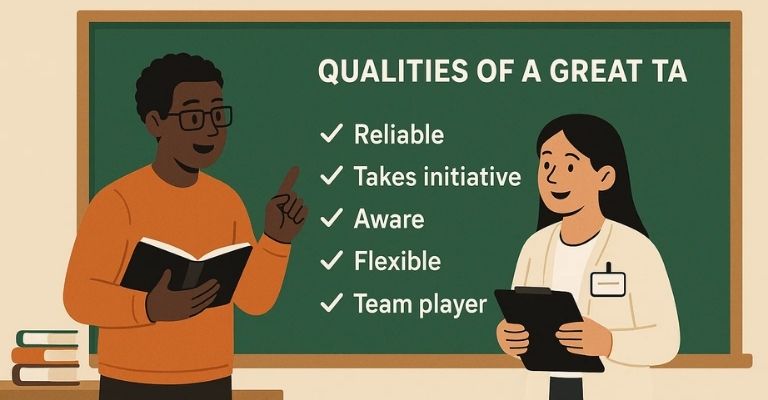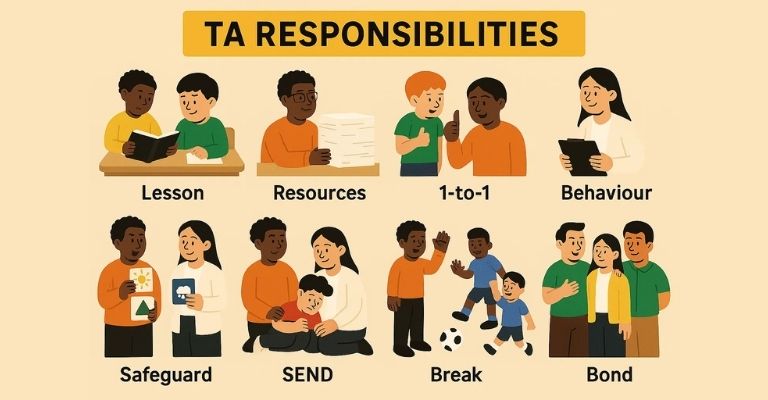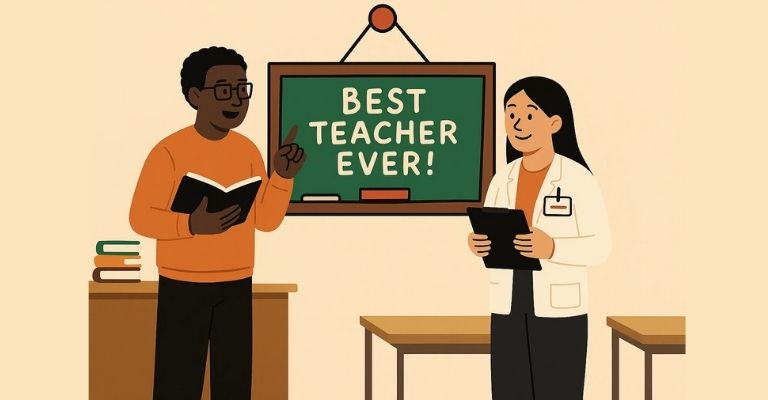What does a teaching assistant do each day in school? Teaching Assistants help pupils learn, manage behaviour, and feel supported. They also work with teachers to prepare lessons, organise resources, and keep learning on track. Their role blends care, focus, and teamwork in every classroom.
Teaching Assistants support teachers and pupils by helping with learning, behaviour, and well-being. From preparing resources to giving one-to-one support, their role is vital in every classroom. TAs help teachers run smooth classrooms and give pupils the focused support they need to thrive. They create space for teachers to plan, while pupils gain the attention and care they need.
In this article, we will tell you 10 key responsibilities of a Teaching assistant. Along with that we will tell you the path, qualifications and skills needed to become a TA in the UK.
What Does a Teaching Assistant Do?

Besides having particular responsibilities, teachers value the following things most in a TA
- Reliability – Teachers need TAs they can count on every day.
- Initiative – Great TAs spot jobs and act without being asked.
- Awareness – They notice when pupils need help or when lessons need support.
- Flexibility – Stepping in quickly keeps the classroom calm and on track.
- Team Spirit – Teachers love TAs who “just get it” and make life easier.
Together, these qualities turn a good TA into an invaluable partner.
10 Key Responsibilities of a Teaching Assistant

1. Supporting Pupils’ Learning in Lessons
- TAs sit with pupils during lessons and keep them focused. They explain tasks in simple steps and encourage steady progress. They also give quick feedback so pupils stay confident.
2. Preparing Classroom Resources
- A smooth lesson needs preparation. TAs photocopy worksheets, arrange books, and set up tools. They also check displays and make sure resources are tidy.
3. One-to-One and Small Group Support
- Some pupils need focused help. TAs spend extra time with children who struggle. They run short group tasks and boost self-belief through patient guidance.
4. Promoting Positive Behaviour
- Behaviour sets the tone for learning. TAs remind pupils of rules, praise good effort, and calmly handle disruption. They also model respect and kindness in daily interactions.
5. Assisting with Assessments
- Teachers track progress with support. TAs ask quick questions to check learning. They mark simple activities, note achievements, and share updates with the teacher.
6. Safeguarding and Pupil Well-Being
- Every TA learns safeguarding rules. They spot changes in mood or behaviour and share concerns quickly. Pupils trust them as caring adults in school.
7. Supporting Pupils with SEND
- SEND pupils often need adapted support. TAs simplify worksheets, use visual prompts, and help with speech. They also give sensory breaks when pupils feel overwhelmed.
8. Helping with Classroom Management
- Classrooms stay ordered with TA support. They organise displays, prepare transitions, and manage tidy-up times. They also keep lessons moving with calm reminders.
9. Supervising Breaks and Lunchtimes
- Learning continues outside lessons. TAs watch playground games, guide safe choices, and support social skills. They also help in dining halls and during school trips.
10. Building Positive Relationships
- Strong bonds shape learning. TAs create trust with pupils through patience and encouragement. They share ideas with teachers and update parents when needed.
What qualifications do I need to be a Teaching Assistant?
So, you’re thinking about becoming a teaching assistant? That’s wonderful. It’s one of those jobs where you get to make a real difference every single day. Whether it’s helping a child learn their first words, supporting someone with their reading, or simply being there with a smile when they need it most—teaching assistants are the heartbeat of the classroom.
Now, let’s talk about the qualifications you might need. Don’t worry—it’s not as complicated as it sounds.
The basics
Most schools like you to have good English and maths skills, usually proven with GCSEs (or the equivalent). That’s because you’ll be helping children with these subjects, so it’s important to feel confident in them.
But here’s some good news: sometimes, experience matters just as much as qualifications. If you’ve volunteered in schools, worked with children, or even helped out in after-school clubs or youth groups, that can be a huge advantage.
Extra qualifications that help
You don’t always need them, but having one of these can make your application stronger:
- A Level 2 or Level 3 Certificate in Supporting Teaching and Learning – This is a common route and shows schools you’re serious.
- Childcare courses – Great if you’d like to work with younger children.
- Special Educational Needs (SEN) training – Very valuable if you want to support children who need a little extra help.
Training on the job
Here’s something reassuring: many schools are happy to hire teaching assistants without formal qualifications. Why? Because they can train you while you work. That means you gain paid experience while working towards a recognised certificate at the same time.
The skills that really matter
Of course, being a great teaching assistant isn’t just about certificates. It’s about who you are. Schools look for people who are:
- Patient and caring
- Good listeners
- Clear communicators with both children and adults
- Flexible, reliable, and ready to step in when needed
If you bring those qualities, you’re already halfway there.
How to Be a Good Teaching Assistant

If you want to know how to be a good teaching assistant, start with the basics. The role needs patience, care, and teamwork. A good assistant makes learning easier for pupils and supports the teacher every day.
A good teaching assistant builds strong relationships. You should take time to know your pupils, listen to them, and show interest in their progress. Trust grows when children feel understood. You also need to work closely with the teacher. Clear communication keeps lessons smooth and well planned.
Patience and positivity matter too. Children learn at different speeds, and some may struggle. Stay calm, give encouragement, and keep a positive attitude. This approach helps pupils feel safe, supported, and ready to try.
Organisation also plays a big part. Good assistants prepare resources, set up activities, and keep the classroom tidy. These small steps make lessons run better. Teachers value assistants who stay one step ahead and are ready for the day.
A strong teaching assistant never stops learning. Schools change often, and pupils’ needs shift. You should join training, learn new methods, and grow your skills. The more you develop, the more helpful you become.
So, learning how to be a good teaching assistant means more than helping in class. It means caring for pupils, supporting teachers, and creating a safe space for learning.
Career Progression Beyond TA
TA career progression does not stop at classroom support. With time and training, you can grow into new roles.
- Move into HLTA training: A Higher Level Teaching Assistant takes on bigger duties. You may plan lessons, lead groups, and cover classes when the teacher is away. This role gives more responsibility and a step up in pay.
- Specialise in SEN: Many TAs enjoy supporting children with additional needs. With the right training, you can become a SEN specialist. You help pupils with tailored strategies, work with outside experts, and often play a key role in pupil progress.
- Step from TA to teacher: Some TAs choose to train as teachers. Your classroom experience makes you ready for teacher training. You already know how schools run, so the move feels natural.
In short: TA career progression offers real variety. You can aim for HLTA training, grow into SEN support, or take the path from TA to teacher. Each route keeps you close to pupils while expanding your skills.
How to Become a Teaching Assistant with No Experience
You can still become a teaching assistant even if you have never worked in a school before. Schools value enthusiasm, patience, and a genuine interest in helping children learn.
Steps to Get Started
- Begin with volunteering – offer your time in a local school to gain first-hand classroom experience.
- Take short courses – start with Level 2 or Level 3 teaching assistant qualifications UK to build skills.
- Look for apprenticeships – apply for TA training courses that pay you while you learn on the job.
- Highlight transferable skills – use experience from childcare, youth work, or customer service to show your strengths.
- Apply directly to schools – some schools hire beginners who show strong commitment and a willingness to train.
Moving Forward
Once you start, you can grow your career. Take extra CPD for teaching assistants, work towards HLTA training, or even move from TA to teacher later.
Continuing Professional Development (CPD) for Teaching Assistants
Being a TA is not only about helping pupils. It is also about investing in yourself. CPD for teaching assistants keeps your skills sharp and opens new doors.
Why CPD matters
- You gain fresh ideas for literacy, maths, and behaviour support.
- You build confidence in safeguarding and classroom strategies.
- You stand out when applying for new roles.
Routes to grow
- Take TA training courses in SEND, EAL, or pastoral care. These skills are in high demand.
- Aim for teaching assistant qualifications UK like Level 2 or Level 3 awards.
- Explore specialist modules that focus on autism support, phonics, or positive behaviour.
Career progression through CPD
- Use professional development for TAs to prepare for HLTA status.
- Train step by step if you plan to move from TA to teacher.
- Stay updated with new teaching approaches, which makes you a trusted partner for teachers.
Where to find CPD
- Local councils often run free or low-cost short courses.
- Academy trusts may offer in-house training.
- Online providers such as Unified Course make learning flexible and easy to fit around work. Check out the Teaching Assistant course at Unified Course.
- Professional bodies share resources, updates, and recognised qualifications.
CPD for teaching assistants is a game-changer. Even a short online course can refresh your skills, boost your CV, and help you shine every day in the classroom.
FAQs About Becoming a Teaching Assistant
1. Do I need experience to join the course?
No, you don’t. This course is beginner-friendly and gives you the skills schools want.
2. What qualification will I get?
You earn a recognised Teaching Assistant qualification that helps you apply for real school jobs.
3. How long does the course take?
Most learners finish within a few months, but you can study at your own pace.
4. Can I study online?
Yes, the full course runs online. You can learn anywhere with internet access.
5. Will this course help me find a job?
Yes, it builds knowledge, confidence, and a certificate that makes your CV stronger.
Final Thoughts
That was your answer to “What Does a Teaching Assistant Do? Becoming a teaching assistant is a rewarding path. You support pupils, help teachers, and make classrooms run smoothly. The role can grow with you over time. You can move into HLTA training or even full teacher training later.
Every step you take builds skills and confidence. With the right course, you can start strong and keep progressing.




